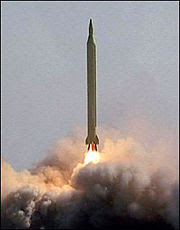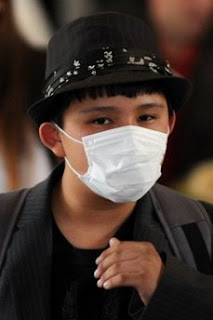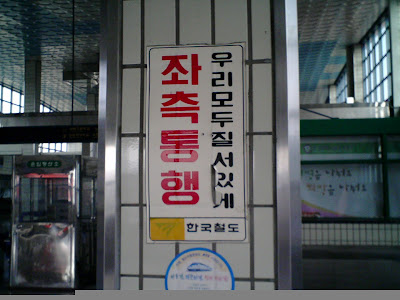PBS has
another discussion between Selig Harrison and Balbina Hwang about North Korea's vow to pull out of the six-party talks (I focused on an earlier PBS discussion
here). Quite an interesting exchange, though Mr Harrison seems a bit confused whether it's a
missile launch or a
satellite launch.
Speaking of which, how's this for a WTF moment: The AFP is reporting that South Korean Defense Minister Lee Sanghee has told the Korea National Assembly that whatever it was that North Korea launched over the East Sea/Sea of Japan last week "
followed the trajectory of a satellite."
Come again?
At first I was quite incredulous at this bit of news, since I was seeing it in
the People's Daily (which said South Korea "admitted" that it followed a satellite trajectory) and
China Daily, two less than objective sources when it comes to South Korea or the United States.

Now I'm not just thinking out loud here; I'm genuinely asking for information here because I'm not exactly a rocket scientist. First, what is the evidence, what is the slam-dunk case that this was a test launch of a weaponized missile? And by slam dunk I don't mean "Saddam Hussein has WMDs" slam dunk; I mean actual facts and evidence.
Even before the launch, I'd been starting to wonder whether we all have jumped on a bandwagon without knowing where it's going. The way words were being thrown around and ideas were being conflated were red flags to me.
Here's an example, straight from Mr Harrison himself:
You know that on March 26th they said very explicitly that if even one word of criticism of their missile launch came out of the United Nations, they would discontinue the six-party negotiating process on nuclear weapons, which it started in 2005.
This is not true. North Korea never said they were launching a missile; they've insisted they were launching a satellite with a rocket. Everything else Mr Harrison said may be true, but it looks like North Korea is acknowledging that they were test launching a missile, an admission they did not make.
I'm having flashbacks of yellow cake and al Qaeda meetings with Saddam Hussein, from a time when a majority of Americans believed the Iraqi leader was directly involved in the 9/11 attacks.
And then there's this niggling little thought in the back of my brain: What does North Korea have to gain from firing a missile? It already has massive artillery pointed at South Korean cities and probably a plan of attack for the Japanese coast, which would put some sort of threat of mutual destruction in play, thus seriously lowering the risk of a US-led or ROK-led attack on the DPRK. Moreover, their supposed test of a nuclear device a few years ago also gives them considerable leverage in preventing an attack.
So if a missile wouldn't actually bolster their defense, what would it be good for? We are told that it enhanced the image of the Dear Leader to his people, who believe they are under siege by a hostile US-led coalition poised against them. Such a technological breakthrough, we are told, is the North Koreans' way of thumbing their nose at Washington.
More ominously, we are told that North Korea could earn some serious coin by selling its advanced missile technology to rogue states or organizations. They already are involved with missile exports, so this is not so far-fetched.

But wait a minute, wouldn't Pyongyang benefit just the same if they were able to put a satellite into orbit? They would gain considerable prestige, both domestically and internationally, but with the added benefit of not being such a pariah. And making Washington look like a belligerent fearmonger would earn the North Korean regime some respect and street cred in many parts of the world.
Moreover, look at the comparative benefits of developing satellite launch technology versus advanced missile technology. First and foremost, launching a communications satellite on the cheap for a moderately poor country is not going to earn you enemies, whereas having a missile Iran uses to flatten Tel Aviv will bring a world of hurt. Second, there's a lot of money to be made in satellite launching, especially if you get good at it and you can do it cheaply.
According to How Stuff Works, a satellite launch can cost $50 to $400 million. That's a lot of coin, and it's
legit coin.
So for a North Korean regime that wants to earn some hard cash, wow its citizenry, raise its stature around the world, piss off the United States, and not become a pariah, going into the satelite launching business is a no-brainer compared to making long-range missiles.
Right?
Of course, I'm assuming that the two technological spheres require similar levels of cost and expertise. Neither one is easy to accomplish, but one or the other many be much harder. Indeed, there are other questions to ask as well. For starters, is Defense Minister Lee's claim true? And if it is true, what does it mean? As in, is it possible that a missile and a satellite launch have such similar trajectories that this is inconclusive (Wikipedia says the
Unha-2 satellite launcher and the Taepodong-2 ballistic missile have the same delivery system)? If this is a satellite test launch, are we accurate in calling it a missile instead of a rocket? Is a satellite launch also (like a missile test) a violation of UN sanctions?
I want answers, and I must admit that all of this is a little devil's advocate...ish. Maybe I'm being naïve, but I think I'm going to stop calling it a missile launch for now, though I'm a bit loath to call it a rocket launch. I'll just call it a launch.
Sphere: Related Content
 While
While 










 The
The 










 But back to the US, where
But back to the US, where 











 Frankly, I think people are too premature about that, talking about how weak he is, how emaciated, how he's got one foot in the grave. I don't think such people have a whole lot of experience with stroke survivors. The guy is walking around and talking and smiling.
Frankly, I think people are too premature about that, talking about how weak he is, how emaciated, how he's got one foot in the grave. I don't think such people have a whole lot of experience with stroke survivors. The guy is walking around and talking and smiling. 























